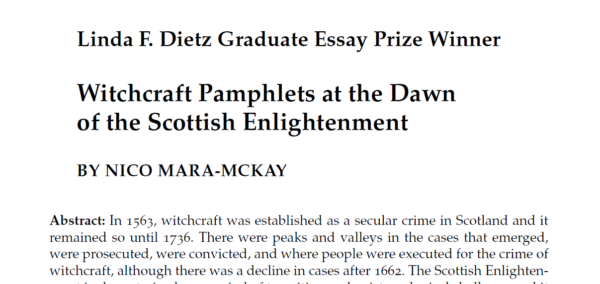My article “Witchcraft Pamphlets at the Dawn of the Scottish Enlightenment” was recently published in the Canadian Journal of History as the winner of the Linda F. Dietz Graduate Essay Prize.
I initially wrote the article as a term paper for Dr Elizabeth Ewan’s excellent class on Scottish archival research at the University of Guelph. I very much thank her, the anonymous peer reviewer, and my current supervisor, Dr Alison More, for their remarks and suggestions on how to improve the paper.
I’m grateful to past and current professors who have encouraged me and my work, and while this is a subject where I’m not an expert, I did have lot of fun researching and working on this paper-turned-article.
Academia is weird, in that I don’t know if this counts as a first published article, because it’s as a gradate prize rather than just an article on its own, and I suspect that these distinctions matter, somehow. (Or, for that matter, whether the article I published during my undergrad in an undergraduate journal counts. Though doubt it for that one.) Either way, I’ll keep working and writing and hope that it all goes somewhere useful.
The abstract in English and French:
You can find the article’s DOI page here: https://utpjournals.press/doi/epdf/10.3138/cjh.56-3-2020-0038.


